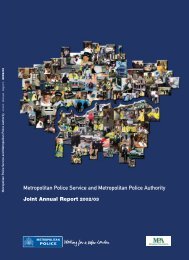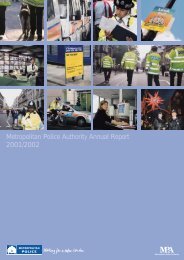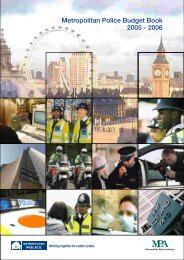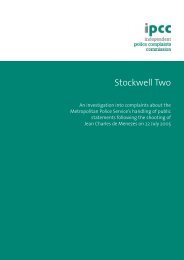Final Report of the Morris Inquiry: The Case for Change
Final Report of the Morris Inquiry: The Case for Change
Final Report of the Morris Inquiry: The Case for Change
Create successful ePaper yourself
Turn your PDF publications into a flip-book with our unique Google optimized e-Paper software.
LESSONS FOR THE FUTURE<br />
“<strong>The</strong> MPS has relied in its arguments <strong>for</strong> not proceeding with a disciplinary hearing primarily<br />
on broader public interest arguments concerned with <strong>the</strong> needs <strong>of</strong> <strong>the</strong> police service to<br />
recruit and retain more people from black and minority ethnic groups, and specifically its<br />
assessment that in this case to set aside <strong>the</strong> agreement reached with <strong>the</strong> Black Police<br />
Association would be to jeopardise its own strategy and plans <strong>for</strong> such recruitment.We have<br />
given careful consideration to <strong>the</strong>se arguments but dismiss <strong>the</strong>m as matters that do not have<br />
sufficient pertinence to ei<strong>the</strong>r <strong>the</strong> case in hand or to <strong>the</strong> specific public interest in upholding<br />
<strong>the</strong> police disciplinary system.<strong>The</strong>y are essentially extraneous management concerns,<br />
legitimate and important in <strong>the</strong>ir own right but never sensible grounds <strong>for</strong> manipulating a<br />
disciplinary system. Indeed <strong>the</strong> failure <strong>of</strong> <strong>the</strong> MPS to keep <strong>the</strong> two separate has led to <strong>the</strong><br />
confusion and poor judgements characterising this case.”<br />
(Decision <strong>of</strong> <strong>the</strong> IPCC Review Panel.)<br />
10.56 We asked <strong>the</strong> Deputy Commissioner about <strong>the</strong> IPCC’s criticism and he made<br />
clear that, in <strong>the</strong> MPS’ view, <strong>the</strong>re were over-riding strategic management concerns<br />
which justified <strong>the</strong> approach taken. Superintendent Dizaei referred to <strong>the</strong>se when<br />
he gave evidence:<br />
“… once you look at where this case started, <strong>the</strong> cost to <strong>the</strong> taxpayer, <strong>the</strong> cost to <strong>the</strong> confidence<br />
<strong>of</strong> policing, <strong>the</strong> trauma it caused to my family, to my colleagues, to my community, and <strong>the</strong> potential<br />
damage this would have had as this matter went to discipline – which, from my understanding,<br />
a fur<strong>the</strong>r eminent QC was appointed to represent <strong>the</strong> Metropolitan Police – and <strong>for</strong> it to <strong>the</strong>n<br />
go to an employment tribunal listed <strong>for</strong> four months, I think it was perfectly sensible <strong>for</strong> all<br />
those involved, <strong>the</strong> Metropolitan Police Authority, <strong>the</strong> Commissioner and my legal team, to try<br />
to resolve this problem and I am delighted that <strong>the</strong>y did.” (Evidence <strong>of</strong> Superintendent Dizaei.)<br />
10.57 To an extent, we understand <strong>the</strong> MPS’ concerns at <strong>the</strong> time, in particular its<br />
desire to resolve intractable management issues facing <strong>the</strong> organisation. However,<br />
we consider that it is never appropriate <strong>for</strong> a public body such as <strong>the</strong> MPS to enter<br />
into an agreement that is ultra vires, and which is likely to bring <strong>the</strong> organisation<br />
into disrepute with its own staff and <strong>of</strong>ficers, as well as <strong>the</strong> wider public.<br />
10.58 Failing to consult <strong>the</strong> PCA, which had a statutory role in <strong>the</strong> case at <strong>the</strong> time<br />
<strong>the</strong> settlement agreement was drafted, was a fundamental error, as <strong>the</strong><br />
Commissioner himself pointed out when he gave evidence: “I do not know whe<strong>the</strong>r<br />
Ian Blair actually contacted <strong>the</strong> PCA. If it had been me as Deputy Commissioner I would have<br />
contacted <strong>the</strong> PCA and <strong>the</strong>y would have been involved in negotiations, because remember, <strong>of</strong><br />
course, <strong>the</strong>y had <strong>the</strong> job <strong>of</strong> supervising that inquiry from start to finish.”<br />
Media issues<br />
10.59 A number <strong>of</strong> criticisms have been made <strong>of</strong> <strong>the</strong> way in which <strong>the</strong> MPS<br />
handled media issues during Operation Helios. Superintendent Dizaei contends<br />
that <strong>the</strong> organisation had a proactive media strategy that apparently was devised<br />
247


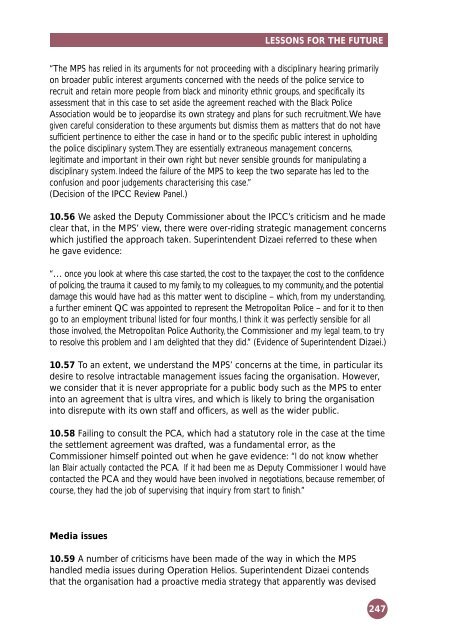
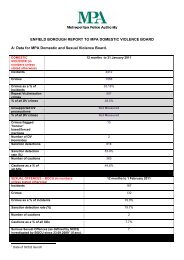
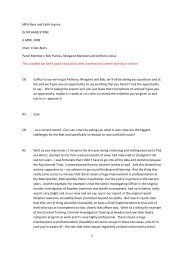
![Appendix 1 [PDF]](https://img.yumpu.com/51078997/1/184x260/appendix-1-pdf.jpg?quality=85)

![Transcript of this meeting [PDF]](https://img.yumpu.com/50087310/1/184x260/transcript-of-this-meeting-pdf.jpg?quality=85)
![Street drinking in Hounslow [PDF]](https://img.yumpu.com/49411456/1/184x260/street-drinking-in-hounslow-pdf.jpg?quality=85)

